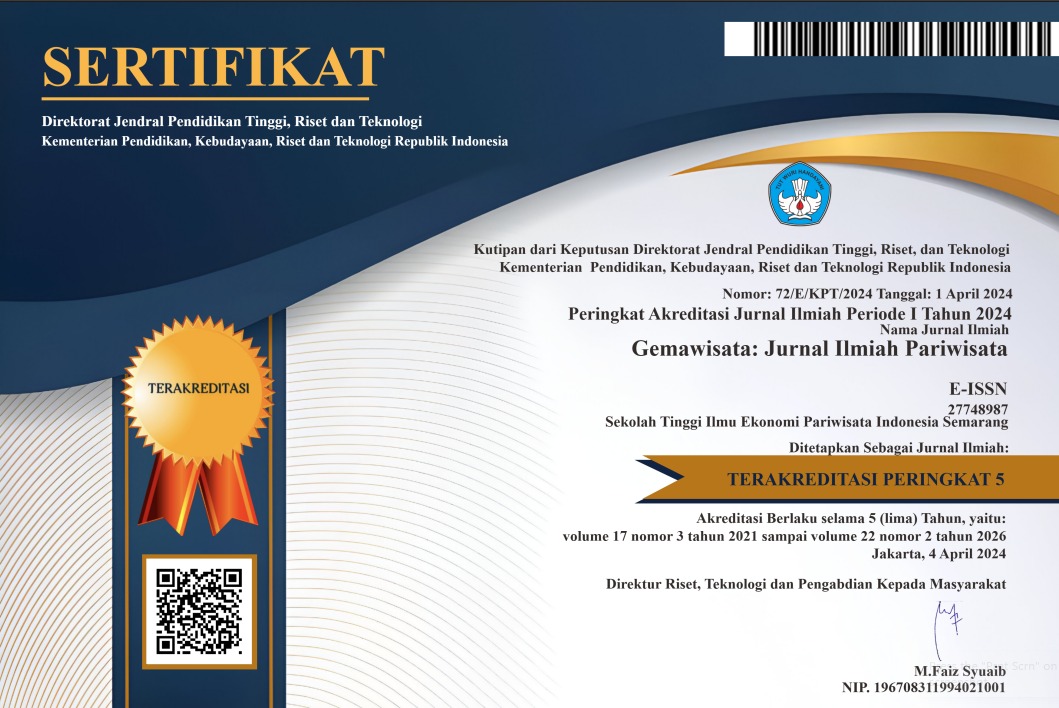Strategi Grand Royal Denai Bukittinggi dalam Meningkatkan Kepuasan Tamu Melalui Penyajian Makanan Halal
DOI:
https://doi.org/10.56910/gemawisata.v21i3.870Keywords:
Guest Satisfaction, Halal Food, Halal Tourism, Hotel, StrategyAbstract
This study aims to analyze the strategies of Grand Royal Denai Hotel Bukittinggi in enhancing guest satisfaction through the provision of halal food, considering the growing global halal tourism trend and Indonesia's significant potential as a country with a majority Muslim population. Furthermore, the increasing awareness among Muslim travelers regarding the importance of consuming halal food constitutes an essential background for this research. Employing a qualitative approach with a descriptive method, the study was conducted in October 2024 using data collection techniques including observation, interviews with management and guests, as well as documentation. The data were analyzed using a SWOT approach to identify the hotel’s strengths, weaknesses, opportunities, and threats. The results indicate that Grand Royal Denai possesses strengths such as a commitment to halal standards, a professional kitchen team, a strategic location, and menu variety, while its weaknesses include the absence of MUI halal certification and limited digital promotion. The primary opportunity arises from the increasing halal tourism trend, whereas threats involve intense competition among hotels and changes in modern consumer preferences. By leveraging its strategic location and the potential of the halal tourism market, the hotel is able to increase guest visits and enhance overall satisfaction. Overall, the halal food provision strategy has proven effective in improving guest satisfaction; however, the hotel needs to innovate its menu, expedite halal certification, and strengthen digital-based promotion to maintain competitiveness. In addition, this study contributes to the development of halal tourism and serves as a practical reference for other Sharia-compliant hotels.
References
Aliyul Wafa, A., et al. (2023). Fiqih. Jombang: LPPM Universitas KH. A. Wahab Hasbullah.
Ariffin, S., et al. (2021). Halal food service quality and customer satisfaction in hospitality industry. International Journal of Hospitality Management.
Chandra, T., dkk. (2020). Service quality, consumer satisfaction, dan customer loyalty: Tinjauan teoritis. Malang: CV IRDH.
Dewi, O. M., et al. (2024). Halal lifestyle and millennial consumer decision in hotel restaurant selection. Journal of Halal Studies, 5(2), 45–59.
Hasan, M., Ramli, A. H., & Nurmayanti, S. (2021). Manajemen strategi dalam praktik bisnis modern. Jakarta: Prenadamedia Group.
Hermanto, A., & Yuhani’ah, R. (2024). Fiqih makanan minuman kontemporer. Malang: CV Literasi Nusantara Abadi.
Hulfa, I., et al. (2024). Manajemen perhotelan dan pariwisata. Kabupaten Badung, Bali: Intelektual Manifes Media.
Januardin, et al. (2021). Kepuasan pelanggan. Medan: UNPRI Press.
Napu, D. M., et al. (2023). Pengantar bisnis pariwisata: Perhotelan, food and beverage service, dan pengembangan destinasi wisata. Kabupaten Badung, Bali: Intelektual Manifes Media.
Nurmaydha, A., et al. (2019). Standar kualitas produksi pada restoran halal di hotel syariah. Jurnal Pariwisata dan Perhotelan, 10(2), 120–135.
Rangkuti, F. (2015). Analisis SWOT: Teknik membedah kasus bisnis. Jakarta: PT Gramedia Pustaka Utama.
Rifa’i, K. (2023). Kepuasan konsumen. Jember: UIN Khas Press.
Riswanto, A., et al. (2024). Strategi manajemen. Jambi: PT Sonpedia Publishing Indonesia.
Syufa’at, & Zayyadi, A. (2022). Islamic tourism: Potensi dan strategi pengembangan pariwisata syariah. Yogyakarta: Pustaka Ilmu.
Tasya, N., & Malahayatie. (2024). Halal assurance and tourist trust in hospitality services. Indonesian Journal of Halal Tourism, 6(1), 30–42.
Tyaswening, E., & Kuntari, R. (2023). Dasar-dasar perhotelan. Jakarta Selatan: Kementerian Pendidikan, Kebudayaan, Riset, dan Teknologi.
Winengan. (2020). Industri pariwisata halal: Konsep dan formulasi kebijakan lokal. Mataram: UIN Mataram Press.


1_(1).jpg)






